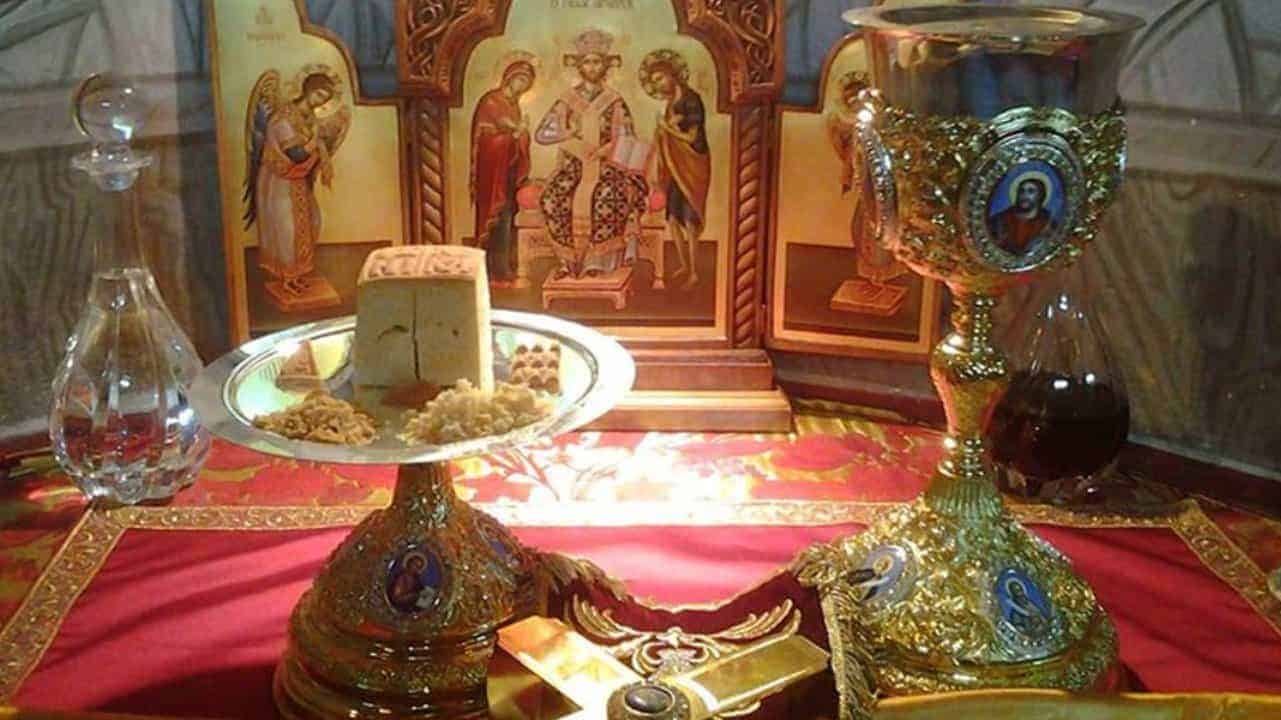
Throughout our previous sermons, we saw the establishment of the Mystery of the Eucharist by our Lord Jesus Christ, on the night of Holy Thursday, which has since been offered in every Divine Liturgy. In this the Lord unites Himself with Christians through His Holy Body and Blood, cleanses them from their sins, and sanctifies them. At the same time, the Mystery of the Eucharist rejuvenates the Church, and ensures the unity of its members. We also hear in the foundational words of this Sacred Mystery proclaimed by the Lord that His Blood, which is poured out for many for the forgiveness of sins and offered to the faithful to drink, seals the new covenant (see Matthew 26:28).
What is this “new covenant” which the Lord seals with His Blood?
A “new covenant” implies the existence of an old covenant. We know the covenant that God made with the Prophet Moses on Mount Sinai. It was through this covenant that Moses came to know the will of God, and which the Israelites had to accept and honor. In fact, God wrote a summary of His commandments on two stone tablets and gave them to Moses. The old covenant was then sealed with blood: For when Moses had spoken every precept to all the people according to the law, he took the blood of calves and goats, with water, scarlet wool, and hyssop, and sprinkled both the book itself and all the people, saying, “This is the blood of the covenant which God has commanded you” (Hebrews 9: 19-20).
At the Last Supper, the Lord associated His new covenant with the old, in that while the blood of calves and goats sealed the covenant with Moses, His new covenant would be sealed with His own blood, which alone has the power to cleanse the people from sin. The Apostle Paul emphasizes this particular point: "For it is not possible that the blood of bulls and of goats could take away sins" (Hebrews 10:4).
All that the Lord has taught is bound and confirmed in the Mystery of the Divine Eucharist. As we know, these teachings have come to us in the Holy Gospels and in the writings of His Disciples. Taken together, it constitutes the part of the Bible known as the New Testament. The last words of the Lord, according to the tradition of the Mystery of the Eucharist, are quoted by the Apostle Paul in his First Epistle to the Corinthians (11:25): "This do, as often as you drink it, in remembrance of Me.”
These words are rich in meaning, and require interpretation, which only the enlightened Fathers of our Church can give us. Let us look briefly at what the Holy Fathers say about “remembrance.”
The Eucharist is the liturgical remembrance of that first sacramental Supper, but also of all that the Lord has done from the beginning of creation for our sake. With the Divine Eucharist we act as Christ acted. We offer the Holy Anaphora in remembrance of His death and Resurrection: "Remembering, therefore…" With liturgical remembrance we do not just recall Christ's sacrifice, but live it.
Not only that, this remembrance of all the blessings of the Lord that we have received increases our gratitude towards Him. We could say that the Eucharist is the fruit of the remembrance of Christ.
This, after all, was what Christ intended when He commanded us to remember Him: Let us not become ignorant and thus lose His divine gifts. The remembrance of His blessings increases our appreciation, and it draws us closer to Christ. And we, in order to be with Christ, must be "giving thanks always for all things to God the Father in the name of our Lord Jesus Christ" (Ephesians 5:20).
One more important point to examine, before we begin to look deeper into what is said and done during the Divine Liturgy, is this:
Who actually presides at the Divine Liturgy?
We all know that at least one Bishop or Priest is needed to offer the Divine Liturgy, but the real minister of the Divine Liturgy is Christ Himself, every time. He offered the divine Eucharist at the Last Supper, and He continues to do so always. Bishops and priests are servants of the Divine Mysteries, but it is the Lord who changes and sanctifies them. Christ is the One who brightens with His presence the Last Supper and the Eucharist. In the Divine Liturgy, we see Christ Himself in the person of the priest. When you receive Holy Communion from your priest, do not think that the priest is doing this, but rather the outstretched hand of Christ. The priest simply lends his tongue to Christ and offers his hand, as can be seen in the Prayer of the Cherubic Hymn: "For You are the One Who both offers and is offered, the One Who is received and is distributed, O Christ our God, and to You we offer up glory… now and forever and to the ages of ages. Amen."





